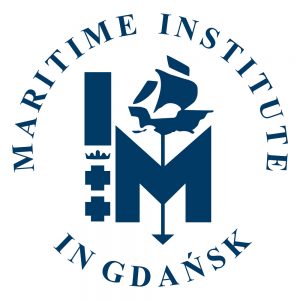The Maritime Institute in Gdańsk (MIG) is a research and development unit supervised by Polish Ministry of Maritime Economy and Inland Navigation which is the national authority responsible for management of the Polish sea space. For over sixty years MIG’s mission has been to facilitate preservation of the values of the sea and sustainable development of Polish maritime economy. The Institute employs 120 research and administrative staff in five departments and several units. MIG conducts research, studies and assessments for maritime governmental agencies, offshore maritime companies, as well as for scientific institutions from Poland and abroad in the fields of:
- Operational oceanography
- Shaping and conservation of the nature
- Marine ecology
- Integrated management of the coastal areas and maritime spatial planning
- Maritime hydrotechnics
- Monitoring and threats prevention of the Southern Baltic
- Physical and chemical studies of the biotic and abiotic elements of marine environment
- Water economy and maritime engineering
- Modernization and management of sea ports
- Establishing databases and monitoring of continuous phenomena
- Transport economy, maritime law and economics
- New technologies and electronic economy
MUSES Personnel

Jacek Zaucha is primarily responsible for the co-ordination of WP2, but also engaged in other work packages of the MUSES project. PhD holder in economics from the Gdańsk University, Professor in the Economics Department of the Gdañsk University (since 1994), also associated with the Maritime Institute in Gdańsk (since 2007). His research is focused on Maritime Spatial Planning, development of the land-sea interface, and Blue Growth. He has participated in several scientific and applied projects related to those themes such as: Submariner, PartiSEaPate (INTERREG), BaltSpace (BONUS), Arch (7th FP). The results of inquiries are presented in several scientific papers in such journals as Regional Studies, Marine Policy and in the monographs related to the maritime spatial planning in the Baltic Sea Region. He is an author of 105 scientific publications. He is the main author of the first two maritime spatial plans in Poland (2008, 2010), he led the work on preparation of the stock-taking report (Study on conditions of spatial management of Polish Sea Areas) that initiated formal work on maritime spatial planning in Poland in 2015. In 2013 he elaborated the report on blue growth in Poland that WAS commissioned by DG MARE of the European Commission.
 Joanna Przedrzymirska is initiator and coordinator of many projects related to a wide range of maritime and marine themes (e.g. Smart Blue Regions, Baltic Blue Growth, Baltic InteGrid, SUBMARINER, PartiSEApate, ARCH, AQUILO, BRISK, BaltSeaPlan, EfficienSea). Professional interests in participatory management and stakeholders involvement, specialist in territorial cooperation programmes, speaker at conferences organized by the Polish Ministry of Development and Infrastructure, the Ministry of Foreign Affairs, European Commission, Nordic Council of Ministers (Norden) and the pan-Baltic institutions. Since 2011 head of the Project Management Center at the Maritime Institute in Gdansk combining professional interests and experience from previous work in the secretariat territorial cooperation program and its “sea” passion in designing and implementing national and international projects.
Joanna Przedrzymirska is initiator and coordinator of many projects related to a wide range of maritime and marine themes (e.g. Smart Blue Regions, Baltic Blue Growth, Baltic InteGrid, SUBMARINER, PartiSEApate, ARCH, AQUILO, BRISK, BaltSeaPlan, EfficienSea). Professional interests in participatory management and stakeholders involvement, specialist in territorial cooperation programmes, speaker at conferences organized by the Polish Ministry of Development and Infrastructure, the Ministry of Foreign Affairs, European Commission, Nordic Council of Ministers (Norden) and the pan-Baltic institutions. Since 2011 head of the Project Management Center at the Maritime Institute in Gdansk combining professional interests and experience from previous work in the secretariat territorial cooperation program and its “sea” passion in designing and implementing national and international projects.

Marija Lazic (MSc in Maritime Spatial Planning, BSc/MSc in (Marine and Inland) Waterway Transportation Engineering) works as a Maritime Spatial Planning Specialist at the Maritime Institute in Gdansk. Marija started her career in 2008 working on terrestrial planning in Serbia, developing the transportation sector while addressing its negative impact on the environment. She has served a major expert role in terrestrial planning, leading a working group for waterway transportation within the Serbian Spatial Plan 2010-2014-2021. Marija has an international master diploma in MSP and research experience in investigating possibilities for improving the effectiveness of marine governance, institutional roles, and processes focusing on vertical and horizontal relations; in analyzing and understanding stakeholder social networks for building effective communication between multi-sector and multi-level stakeholders; understanding the marine governance changes for regional seas and mechanisms for transboundary MSP, applied within the AMER project, led by Polytechnic University of Marche (Italy). Marija has further experience in suggesting measures for management of human activities for sustainable use of marine resources of the North Adriatic Sea within the ADRIPLAN project, led by University IUAV of Venice (Italy). Marija has been an active attendee and speaker at the conferences on transboundary MSP and intergovernmental cooperation introducing Social Network Analysis as strategic tool for planning in complex environments.
At the Maritime Institute, Marija applies her experience to the MUSES Horizon 2020 project, as well as other Blue Growth and MSP related projects.

